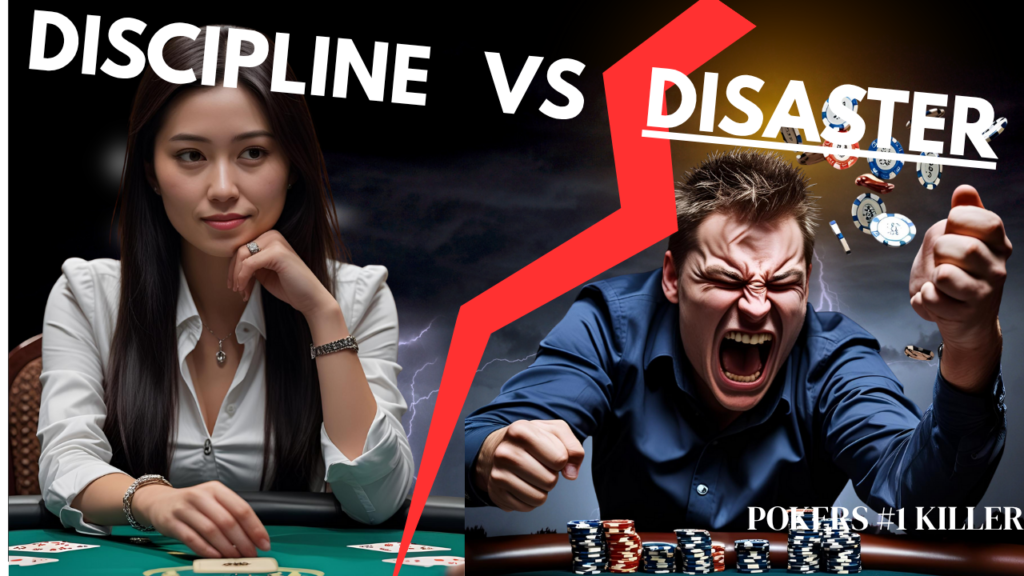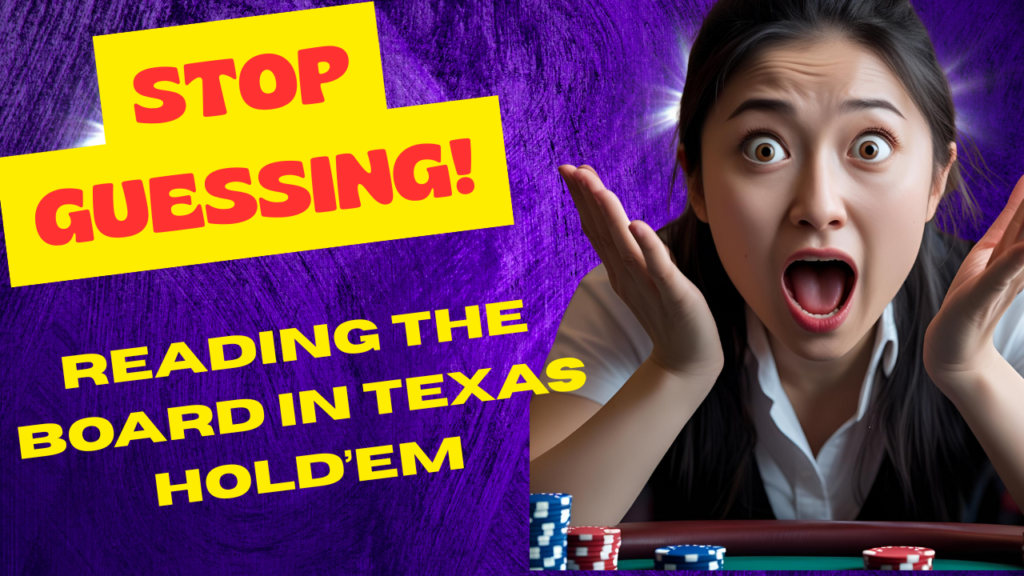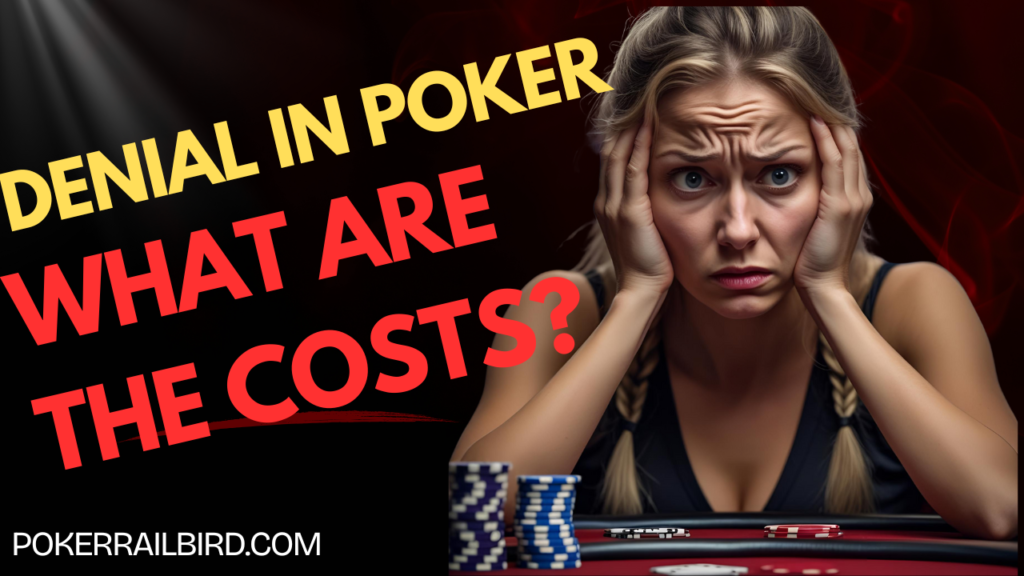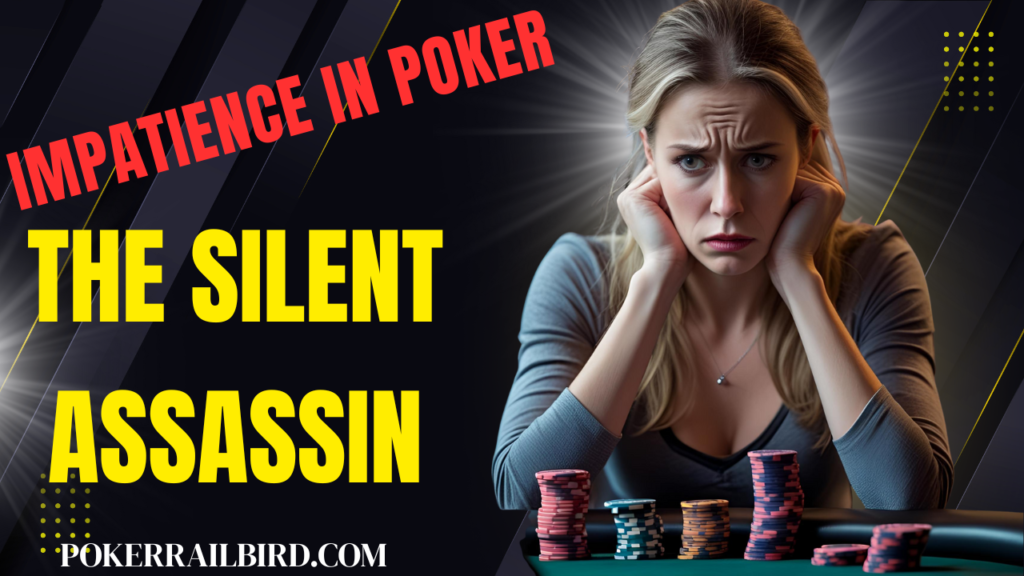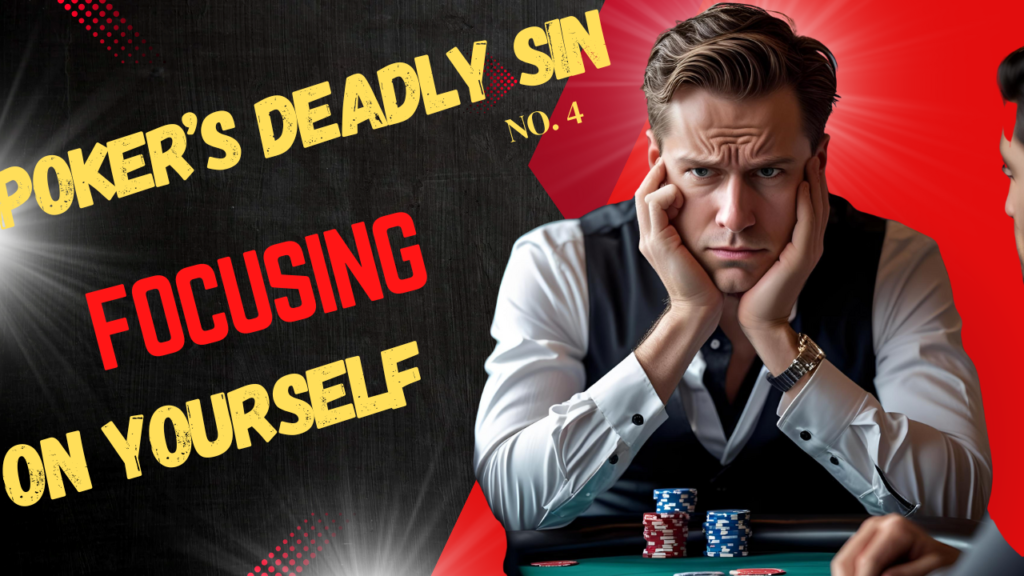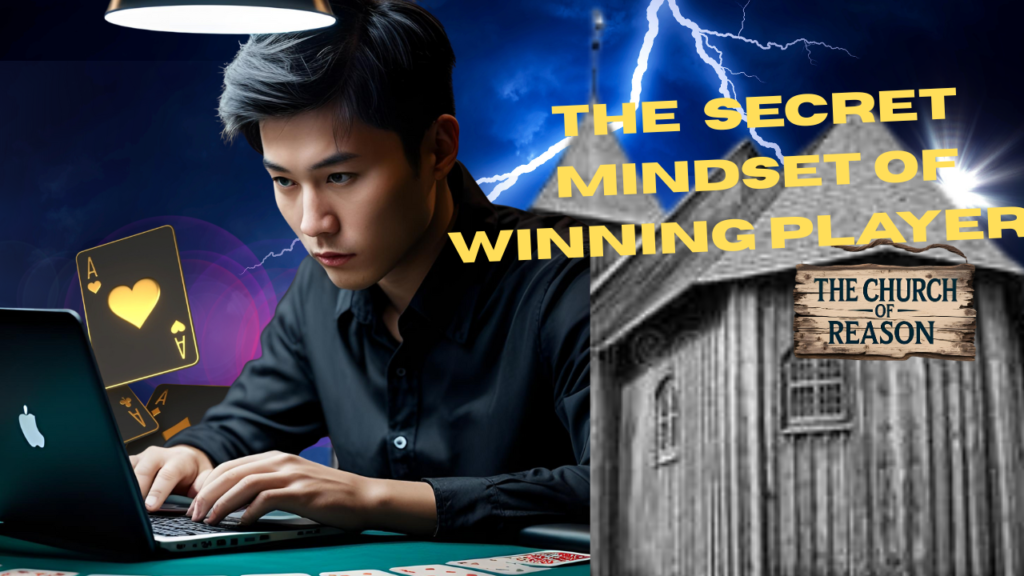FOCUSING ON YOURSELF IN POKER
DEADLY SIN NO. 4
One of the most costly leaks in poker is focusing on yourself instead of the other players. Too many hands are lost, not because of bad cards or bad luck, but because we spend more time staring at our own hole cards, stack size, or “plan,” and less time gathering information from the people we’re actually playing against.
Poker isn’t just a battle between you and the deck—it’s a battle between you and every opponent at the table. The real edge in this game doesn’t come from memorizing charts or praying for big cards. It comes from reading situations, watching patterns, and making mathematically correct decisions based on what other players are doing.
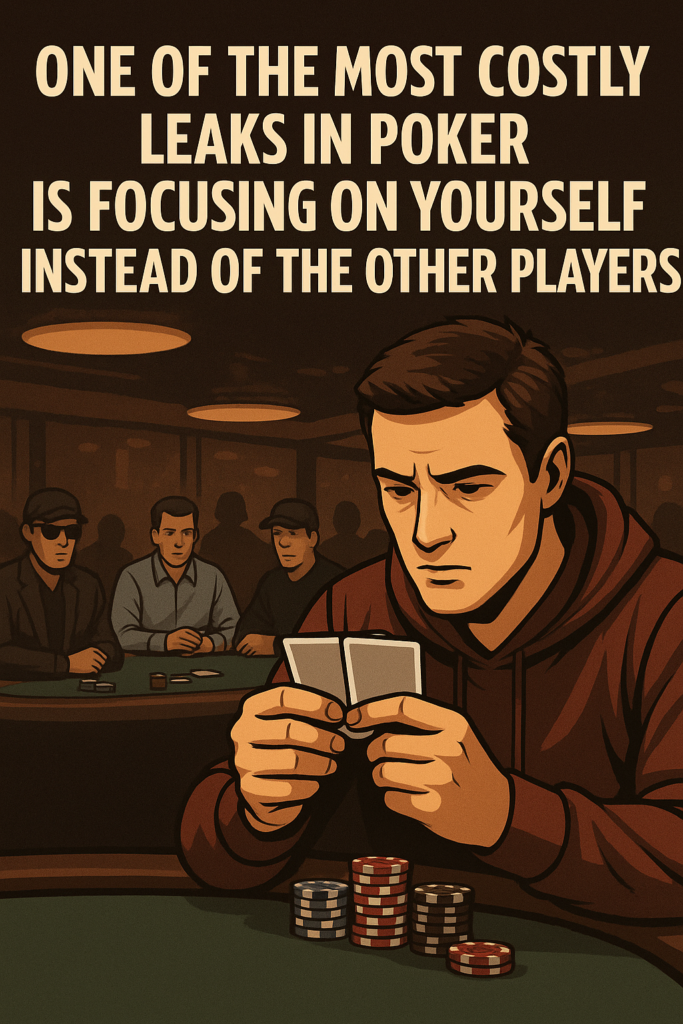
Yet, time after time, players fall into this deadly habit of self-focus: falling in love with a hand, choosing a “lucky” seat instead of a strategic one, or staring down their cards as if the ink might change. And while they’re lost in their own little world, they miss the critical information that tells them who’s strong, who’s weak, and who’s bluffing.
This fourth Deadly Sin is a silent bankroll killer because it robs you of one of the things that makes poker a game of skill: information about the other players. In this article, we’ll break down how self-focus shows up at the table, why it’s so natural to fall into this trap, and how to retrain yourself to shift attention where it truly belongs—on your opponents.
THE COST OF SELF-FOCUS IN POKER
Every time you make poker about yourself, you give away money. It doesn’t happen in one big, obvious hand—it happens quietly, over hours, days, months of missed opportunities and bad reads. Focusing on yourself in poker blinds you to the most important factor in every decision: how the other players are acting.
When your attention is locked on your own cards, your own stack, or your own emotional state, you stop noticing things like:
RAISE FREQUENCY
PHYSICAL & TIMING TELLS
Who is raising every other hand and who only raises with strength? Missing this pattern leaves you constantly guessing.
Nervous chip shuffles, glances at stacks, hesitation before bets—each tells a story you’re not hearing if you’re staring at your cards.
EMOTIONAL SHIFTS
PLAYER TYPES
POSITIONAL DYNAMICS
A player who just lost a big pot may go on tilt, opening up spots to trap or value bet light. Someone stacking chips after a big win might tighten up or start splashing around with confidence.
Loose-aggressive, tight-passive, calling stations, rocks—recognizing these archetypes (and when they change mid-session) is how you predict future actions and exploit tendencies.
Who’s to your left that can squeeze or re-raise you? Who’s behind you waiting to act? Ignoring table flow because you’re lost in your own hand makes even good cards unprofitable.
All of this information is free money—but only if you’re watching for it.
Players focused inward miss these cues, forcing themselves to rely on guesswork. That’s how bankrolls bleed: paying off obvious value bets, folding to bluffs you could have read, and missing your own opportunities to strike.
COMMON WAYS PLAYERS FOCUS ON THEMSELVES INSTEAD OF OTHERS
Self-focus in poker isn’t always obvious. It doesn’t announce itself with a siren or a flashing light. It creeps in quietly, showing up in habits that feel harmless—but that cost you money every time you do them. Here are the most common ways players make the game about themselves and ignore where the real information lies.
FALLING IN LOVE WITH YOUR HAND
Every player has done it. You look down at a “dream hand”—pocket kings, ace-king suited, maybe even that “lucky” nine-eight you can’t resist—and immediately get attached.
The danger? Emotional attachment blinds you to reality.
- Opponent re-raises big from early position?
- The tightest player in the room fires on every street?
- The flush draw you ignored gets there on the river?
You see the signals, but you don’t believe them because you’re already married to your cards. Good players fold when the story says they’re beat. Self-focused players can’t let go—and pay the price.
CHOOSING SEATS FOR COMFORT-NOT STRATEGY
Walk into a poker room and you’ll see players racing for their favorite chair—the one by the dealer, the one near the waitress, the one they always sit in.
But the right seat isn’t about comfort; it’s about position and leverage.
- Sitting with aggressive players to your left? You’ll face pressure all night.
- Passing up seats with weak players on your right? You lose easy value.
Every hand you play starts before the cards are even dealt. Choosing a “lucky seat” over a strategic one is an invisible leak that lasts the entire session.
STUDYING YOUR OWN CARDS INSTEAD OF THE TABLE
You only get two cards. You can memorize them in half a second. Yet many players spend long, anxious moments staring at them, squeezing and rechecking as if the ink might change.
Meanwhile:
- Opponents are glancing at each other after the flop.
- Someone just hesitated before a bet.
- A player who usually snap-calls is now double-checking their stack.
You miss all of it because you’re staring at information you already know. Poker is played against people, not paper rectangles. Every second you look down is a second you’re not learning what they’re holding.
OBSESSING OVER YOUR OWN STACK
Stack size matters, but not in a vacuum. Self-focused players constantly count and re-count their chips, planning their “big move,” while missing the more important question:
- Who at the table is getting short-stacked and desperate?
- Who’s on tilt after a big loss and likely to overplay?
- Did an opponent just double up and is about to steamroll the next few hands?
Poker isn’t about how many chips you have—it’s about how your stack interacts with everyone else’s. Tunnel vision on your own pile keeps you blind to the dynamics that actually drive decisions.
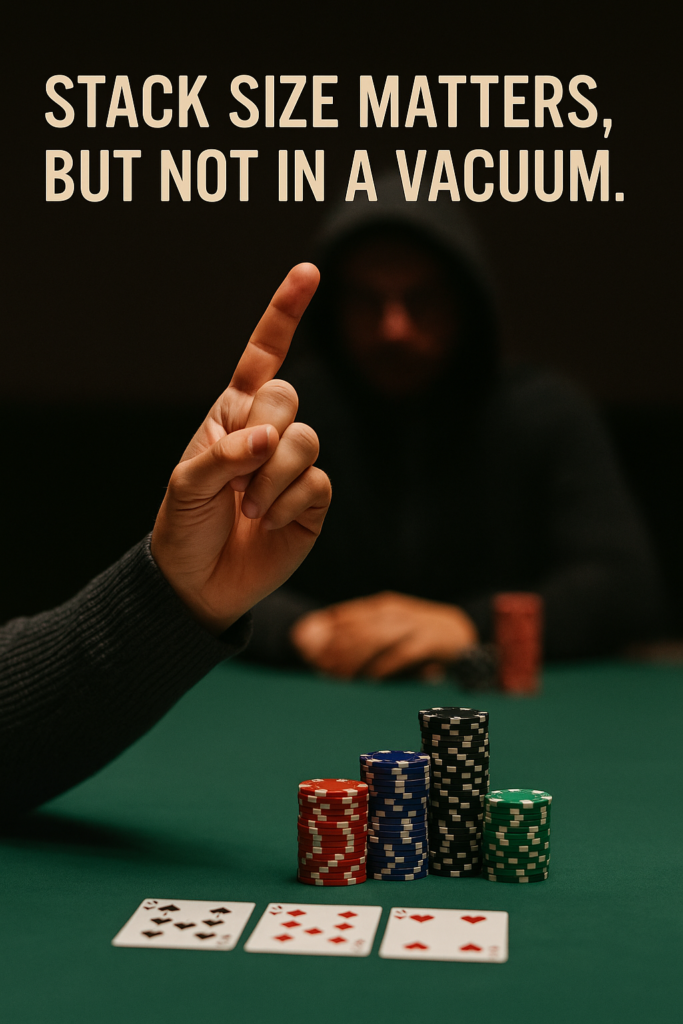
CHOOSING TABLES FOR COMFORT-NOT OPPORTUNITY

Poker is not just a game of decisions—it’s a game of choosing the right battleground. Yet many players sit down wherever it feels comfortable:
- At a table with friends.
- At the first open seat.
- At a table where they “know the dealer” or “like the vibe.”
Meanwhile, the real pros are scanning the room for:
- Soft tables with several weak, passive players.
- Big stacks being splashed around by undisciplined gamblers.
- Seats where they’ll have position on the most exploitable players.
Table selection is the first decision of every session, and it’s one of the few you can make before risking a chip. Ignoring it because you’re focused on your own comfort zone is a leak that costs you quietly over time. Poker is about maximizing advantage, not familiarity.
Self-focus feels safe. It feels like “good poker” to study your cards, think about your stack, or stick to a familiar seat. But every one of these habits pulls your attention away from the real source of power at the table: the other players.
WHY THIS DEADLY SIN PERSIST
It’s easy to tell players, “Pay attention to others.” It’s much harder to break the habit of focusing on yourself in poker, because the pull is deeply human. Psychology shows that our brains are wired to make us self-absorbed at the table—even when it costs us money.
THE SPOTLIGHT EFFECT
COGNITIVE LOAD & LIMITED ATTENTION
SELF-SERVING BIAS
We constantly overestimate how much others notice us. At a poker table, this feels like every bet, every fold, every awkward move is under a microscope. This self-consciousness pulls your focus inward, making you think more about your image than about what opponents are really doing.
The human brain can only process a limited number of inputs at once (famously around 7±2 items). In complex, multi-way pots, players often default to what they control—their cards, their chips, their own plan—because it feels safer than trying to process the chaotic information coming from the table. This tunnel vision shuts out critical reads.
We naturally attribute wins to skill and losses to bad luck or opponents’ stupidity. This inward focus stops players from objectively analyzing what others did right or wrong, locking them in a cycle where they look only at themselves and miss the opportunity to learn from the table.
EMOTIONAL ANCHORING (TVERSKY & KAHNEMAN)
MIND-WANDERING & DEFAULT EGO MODE (KILLINGSWORTH & GILBERT)
When a hand feels “special”—big slick, pocket kings, suited connectors we love—the emotional attachment anchors us to its value, no matter what’s happening on the board or how strong opponents are signaling. We stop reading the situation because our mind won’t let go of the cards in front of us.
The brain’s “default setting” is self-referential thinking. During long stretches of folding or slow play, attention naturally drifts inward: what we’ll do next, how we’ll recover losses, how unlucky we’ve been. Meanwhile, players across the table are giving away information we never notice because we’re stuck in our own heads.
MISSING WHAT'S RIGHT IN FRONT OF YOU
Psychologist Daniel Goleman documented experiments where participants watching social interactions completely missed obvious nonverbal cues because they were preoccupied with their own thoughts. Poker players repeat this mistake constantly—staring at their cards or replaying their last bad beat while missing betting patterns or physical tells that could save them a stack.
Breaking this Deadly Sin isn’t just about poker discipline—it’s about fighting human nature itself. We’re wired to focus inward. Winning players learn how to break that wiring and shift their full attention to where the real money is: the other players.
HOW TO BREAK THIS HABIT
Shifting your attention from yourself to your opponents takes deliberate effort. It’s not a switch you flip—it’s a skill you train. The goal isn’t just to watch others; it’s to gather real information and combine it with math-based decision-making to make the best plays possible.
Here’s how to break the Deadly Sin of self-focus:
MEMORIZE YOUR CARDS INSTANTLY
BUILD A HABIT OF OBSERVATION
CHOOSE YOUR SEAT & TABLE STRATEGICALLY
Look at your hole cards once, lock them in your memory, and keep your eyes up.
Every second you spend staring down is a second you’re missing betting patterns, physical tells, and table dynamics.
Cards don’t change. Information about other players does.
Every hand, even ones you fold, is a chance to learn:
Who plays too many hands? Who folds easily to aggression?
Who changes gears after losing a big pot?
What bet sizes mean strength, and which ones are bluffs?
Observation gives you data. Math converts that data into profitable decisions.
.
Stop sitting where you’re comfortable or where your friends are.
Find tables with weaker opponents, larger pots, and exploitable patterns.
Pick seats with position on the most aggressive players and to the left of big spenders.
Your first edge of the session often comes before the first hand is dealt.
DETACH EMOTIONALLY FROM YOUR CARDS
TRACK PLAYER TENDENCIES & SHIFTS
PRACTICE SITUATIONAL AWARENESS
Pocket kings don’t guarantee profit. Ace-king isn’t a license to commit chips blindly.
Emotional attachment blinds you to opponent signals and math.
Play every hand as part of a decision tree: What do I know about my opponent’s range? What are the pot odds? Does calling or raising make sense beyond my own cards?
Keep mental or written notes:
Who continuation bets often? Who only raises premium hands?
Who just got stacked and might tilt?
Who tightened up after losing, or loosened up after winning?
Poker is a dynamic game. Observation keeps you current. Math keeps you correct.
Your stack, your cards, your plan—all of it matters, but only in context:
Stack-to-pot ratios, position, and opponent profiles matter more than your individual hand strength.
A marginal hand may be profitable against a specific opponent but a fold against another, based on their tendencies and bet sizing.
By combining outward focus with mathematical discipline, you stop making poker a one-player game. Instead, you’re playing real poker—a game of people, patterns, and probability, where every chip you put in the pot is backed by both data from your opponents and sound math guiding your choices.
THE TRUE SOURCE OF POKER POWER: OBSERVATION OF OTHERS
Poker isn’t just a game of cards—it’s a game of decisions about other people, backed by solid math. The deck doesn’t know you. It doesn’t care whether you’ve been folding for an hour or whether you’ve got a favorite hand you love to play. The money on the table moves toward the player who sees the most, understands the most, and makes the sharpest choices based on what the other players are doing—while never ignoring the math that keeps their decisions profitable.
Every advantage you have in poker comes from information, and almost all of that information comes from the people across the felt. Think about what you can know simply by watching:
- Betting Patterns: Who raises light? Who only bets when they’re strong?
- Positional Play: Who takes advantage of late position and who wastes it?
- Reaction to Losses: Who tilts after a bad beat and starts throwing chips away?
- Timing Tells: Who acts instantly with a monster hand and hesitates when bluffing?
- Emotional Signals: Who looks calm and steady, and who leaks tension in every decision?
The more you know about these behaviors, the better you can apply mathematical logic to your decisions:
- Are you getting the right price to call based on what their range suggests?
- Does their betting pattern make a bluff mathematically profitable here?
- Can you fold a strong hand because the numbers don’t support calling against their likely holdings?
POKER IS PLAYED AGAINST PEOPLE
The real secret great players know is this: Poker is played against people, not just the deck—but you still win by making mathematically correct decisions. Reads and observation give you better data. Math tells you what to do with it.
When you focus inward—on your own cards, your own stack, your own imagined plan—you blind yourself to all of this. The game shrinks down to a private battle between you and two pieces of cardboard. But when you open your attention outward, poker expands into a game of observation, prediction, and math-driven control.
That’s where the power is. Not in having pocket aces, not in memorizing charts, but in reading the room better than anyone else and combining it with sound mathematical strategy.
That’s where the power is. Not in having pocket aces, not in memorizing charts, but in reading the room better than anyone else sitting there.
FINAL THOUGHTS-STOP PLAYING IN A BUBBLE
Poker isn’t a solo sport. It’s not you versus the deck, and it’s not just you versus your own emotions. It’s you versus the players across the table.
Every decision you make is stronger when it’s fueled by two things:
- Observation: Real-time data about how your opponents play, react, and adjust.
- Mathematical Discipline: Using that data to make +EV decisions, not guesses or emotional plays.
When you make poker about yourself—your cards, your stack, your plan—you turn off the one advantage that separates good players from everyone else: the ability to see and exploit what others are doing.
Don’t play in a bubble. Learn to memorize your cards, look up, watch, listen, and process what’s really happening at the table. Combine that outward focus with math, and you’ll see the game differently—and profitably.

